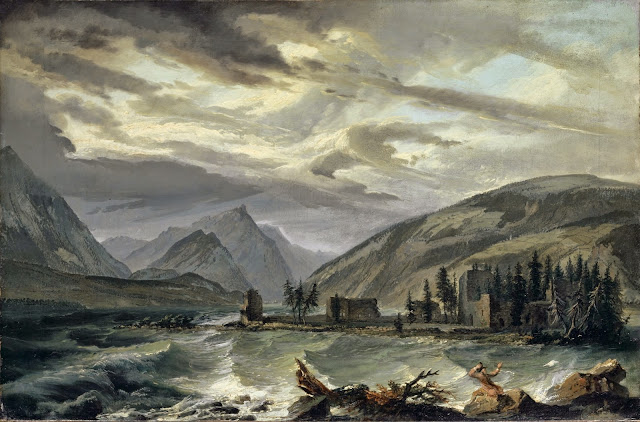The Swiss painter Caspar Wolf was one of the first artists in the West to capture or, indeed, notice, the sublimity of mountains (which had always been celebrated in the East). The time was right for this. British travelers in the Alps a generation before Wolf's birth - men such as Joseph Addison, John Dennis, and the Earl of Shaftesbury - had been deeply affected by their experiences, and had begun to develop an aesthetic-philosophical notion of "the sublime" which was later given fuller body by Edmund Burke in A Philosophical Enquiry into the Origin of Our Ideas of the Sublime and Beautiful (1756), the publication of which happened to coincide with the start of Caspar Wolf's painting career.
Wolf may not have been directly affected by these Britons, although their ideas were in the Enlightenment air; but he was certainly influenced by his compatriot Albrecht von Haller's 1729 poem Die Alpen, and Haller in his turn became a great admirer of Wolf.
Wolf was commissioned in the mid-1770s by the Bernese publisher Abraham Wagner to create a comprehensive series of paintings of the Alps that would be accompanied by texts composed by natural historian Jacob Samuel Wyttenbach.
Wolf and Wyttenbach undertook extensive journeys in the high Alpine regions:
What resulted was a comprehensive picture cycle of the Swiss Alps. Working in his studio from the nature studies completed on location, Wolf created close to 200 paintings of imposing quality that bring together spontaneous observations and highly artistic formulations. Wolf devise[d] a captivating painterly vocabulary to depict mountain ranges and glaciers, waterfalls and caves, bridges and raging torrents, lakes and high plateaus, portraying them now in wide panoramas, now in close, claustrophobic compositions.
Caspar Wolf - and the Aesthetic Conquest of Nature
The subject was novel, but so was Wolf's dramatic way of handling it, which had an immense influence on many later painters: Caspar David Friedrich, Frederic Edwin Church, Albert Bierstadt, Nicholas Roerich, dozens of others.






No comments:
Post a Comment